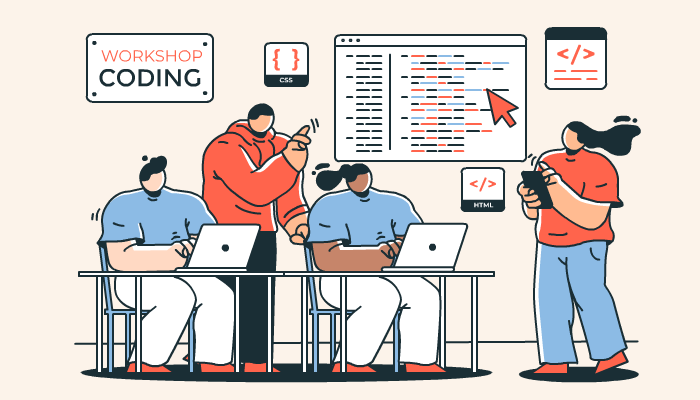Hiring developers from around the world promises tremendous growth for businesses. However, beneath the surface of this global collaboration lies a distinctive challenge – navigating the cultural gap. When hiring Indian developer, this challenge takes the form of nuanced differences in communication styles, work expectations, and decision-making approaches.
In this blog, we’ll explore the challenges of cultural differences when you hire developers in India and provide a blueprint for seamless collaboration. From language barriers to cultural norms, we’ll delve into practical strategies to ensure your remote teams thrive.
Cultural Challenges in Remote Collaboration with Indian Developers
In the context of remote hiring Indian developers, managing cultural gaps is crucial for effective teamwork. These gaps include variations in communication styles, work expectations, and decision-making approaches. Challenges arise from differences in time zones, cultural norms, and work priorities.
Addressing these issues requires clear communication, cultural sensitivity, and a shared understanding of project goals. By actively navigating these cultural gaps, teams can establish a collaborative environment that transcends geographical boundaries, facilitating successful global teamwork.
How Cultural Differences Impact Business
Cultural differences wield a profound impact on businesses, influencing overall performance, productivity, and decision-making. As companies increasingly embrace global collaboration, understanding and navigating these differences become essential for sustained success.
Let’s delve into the specific ways in which cultural disparities can shape and affect business outcomes.
- Work Expectations:
Various cultures harbor distinct expectations regarding work hours, responsiveness, and availability. Some prioritize punctuality and adherence to strict schedules, while others may embrace a more flexible approach. These divergent work expectations can lead to conflicts or frustrations among team members if not properly aligned. Understanding and respecting these differences is crucial for maintaining a harmonious work environment.
- Problem-solving Approaches:
Cultural disparities significantly impact problem-solving and decision-making approaches. While some cultures value achieving consensus through group discussions, others prioritize individual autonomy and swift decision-making.
These differences can affect a team’s ability to reach agreements, make prompt decisions, and effectively resolve conflicts. Awareness of these variations is vital for fostering effective collaboration and decision-making within a diverse team. When you think about hiring a developer in India, make sure you learn about their problem-solving abilities beforehand and your work does not suffer later on.
- Communication Styles:
Different cultures exhibit distinct communication styles, encompassing variations in directness, formality, and reliance on non-verbal cues. For instance, when you hire programmers in India, some cultures may value indirect communication, relying heavily on facial expressions and gestures. Recognizing and adapting to diverse communication norms is crucial for facilitating clear and effective communication within a global team.
- Cultural Norms and Values:
Each culture is characterized by its unique set of norms, values, and beliefs that influence work behavior and interactions. These cultural differences can impact how team members approach tasks, collaborate, and build relationships. For instance, an introverted team member may require support in communicating during virtual group meetings, necessitating individual sessions for effective interaction.
Strategies For Addressing Cultural Differences
1. Understanding the Work Culture in India:
When you hire a developer in India, it’s crucial to grasp the work culture. Indians often value teamwork, respect for authority, and a strong work ethic. Be open to diverse working styles and adapt to the collaborative spirit that is integral to Indian work environments.
2. Clear and Direct Communication:
Communication is key when you hire programmers in India. Keep it simple and direct. Avoid jargon and convoluted language. Be explicit about expectations, deadlines, and project goals. Regular updates and feedback can go a long way in fostering a transparent work relationship.
3. Respecting Time Zones:
India operates in a different time zone, so scheduling meetings that suit both parties is essential. Be mindful of the time difference and plan meetings in a way that doesn’t disrupt the daily flow of work. This consideration reflects respect for your Indian developer time and helps create a harmonious collaboration.
4. Utilizing Video Conferencing Tools:
Thanks to technology, face-to-face communication is possible, even if you’re miles apart. Leverage video conferencing tools for meetings. Seeing each other helps build a personal connection, making the working relationship more than just emails and messages.
5. Cultural Sensitivity and Awareness:
Understanding and respecting cultural nuances is paramount. India has a diverse culture with different languages, traditions, and customs. Learn about your Indian developer backgrounds and show appreciation for their cultural diversity.
6. Flexibility in Work Style:
Indian developers may have their unique working styles and preferences. Be flexible and open to accommodate these differences. Some developers may be more productive at certain times of the day, so allowing flexibility in work hours can enhance overall productivity.
7. Building Personal Connections:
While the primary focus is on work, building personal connections is equally important. Take time to know your Indian developer on a personal level. Ask about their interests, share a bit about yourself, and create a friendly atmosphere. This helps in establishing trust and a sense of camaraderie.
8. Providing Detailed Project Briefs:
To avoid misunderstandings, provide detailed project briefs. Clearly outline the objectives, expectations, and any specific requirements. This ensures that your hired Indian developers have a comprehensive understanding of the project, reducing the chances of errors and revisions.
9. Embracing Diversity in Perspectives:
Different perspectives lead to innovative solutions. Embrace the diversity of thought that comes with working with developers from India. This collaborative approach can lead to creative problem-solving and improved project outcomes.
10. Investing in Team Building Activities:
Virtual team-building activities can bridge the physical gap between you and your Indian developers. Organize team-building sessions, virtual coffee breaks, or casual chats. These activities help strengthen the team bond, fostering a sense of unity despite the geographical distance.
In Conclusion
Effectively navigating cultural differences is imperative for successful collaboration with Indian developers in a global context. By embracing strategies such as clear communication, cultural sensitivity, and fostering a shared understanding, teams can transcend challenges and establish a collaborative environment.
Recognizing the impact of cultural disparities on businesses and actively addressing these differences enables fruitful collaboration and contributes to overall success in the ever-evolving landscape of remote work.

As the editor of the blog, She curate insightful content that sparks curiosity and fosters learning. With a passion for storytelling and a keen eye for detail, she strive to bring diverse perspectives and engaging narratives to readers, ensuring every piece informs, inspires, and enriches.










